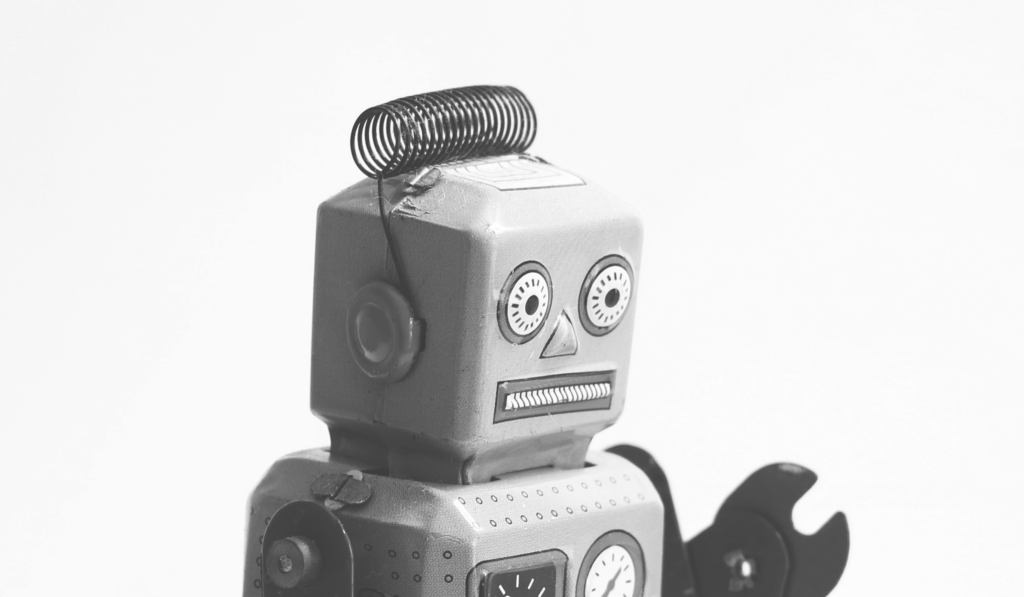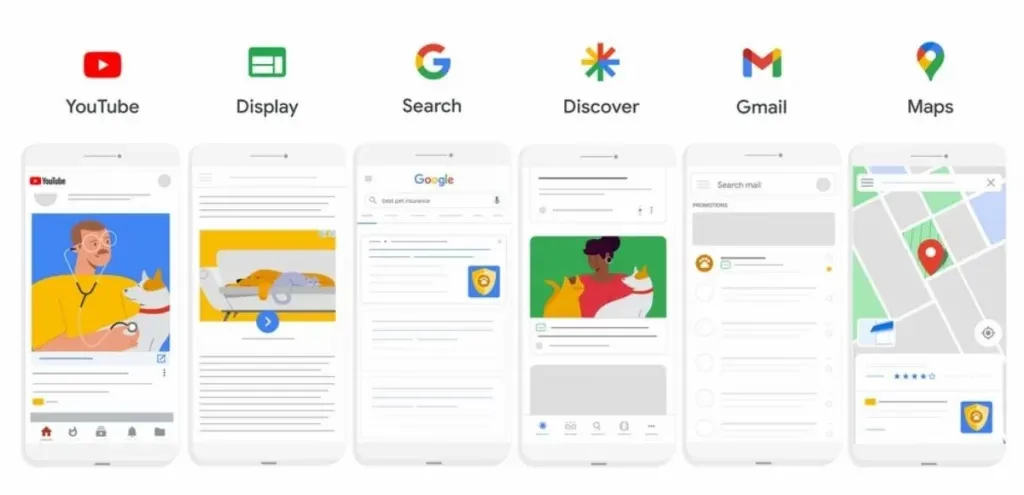
Unless you’ve been living under a digital rock, you’ve probably heard about artificial intelligence (AI) or programmatic software being used to run Google Ads, Facebook, and other pay-per-click marketing campaigns. AI comes with the promise of new tools designed to give marketers an edge over their competitors. Companies also see programmatic digital marketing as a way to save businesses money on the manual labor of managing campaigns with internal resources or an expensive agency.
Anytime a new technology is introduced in marketing, there are always those who try to take advantage of the buzz and lack of knowledge, or lack of understanding about ad networks, to sell services. In this post, we’ll look at agency custom PPC services vs AI PPC management, along with some myths surrounding AI in the space.
Enter PMax & Demand Gen
Performance Max and Demand Gen have been the two primary tools Google recommends when launching new campaigns. While these tools are great to getting running quickly, they come with a few pros and cons.
Pros:
- Easy to set up quickly
- DIY format with AI generated copy suggestions
- Recommended by Google Reps, so they likely walk you through the whole process via zoom
- Access to a wide spectrum of the Google Network (Search, YouTube, Gmail, Display, Discovery, etc.)
- Black-box tech allows for real-time cross-network targeting
Cons:
- Your strategy will be dependent on the quality of your Google Rep (usually not great)
- Limited targeting by demographics and audiences with exclusions or bid adjustments
- Opted-in to all or most of the Google Network by default
- Larger budget needed to see good performance due to wide network exposure ($3,000-5,000 per month is usually minimum we recommend to clients per campaign)
- Limited data on what channel performs best
- Limited exclusions and placement customization
- May aggressively bid up branded search terms, cutting into non-brand budget over time

Should You Automate PPC Or Hire An Agency?
The choice to DIY your campaigns through heavy AI tools automation or hiring a professional PPC manager your PPC isn’t an easy answer. The DIY approach is cost-effective but may result in wasted spend over the long run. A professional PPC firm is likely not to rely as much on automation. It doesn’t mean that they’re not going to use some of the automation tools, it just means they’ll be selective and strategic about how they implement these tools. If you hire an agency and they go all-in on PMax out of the gate, they’re not providing much value for your business.
Signs Of A Good Agency:
- Unlikely to push heavy into automation tools
- Clearly communicates strategy (no smoke and mirrors)
- Doesn’t just make edits based on Google Reps suggestions
- Provides custom reporting based on goals
- Builds a strategy based on proper Network selection and spend levels
- Usually takes a more custom approach to product segmentation
- Defines structure based on buyer personas
When hiring a firm you may see some of these common claims:
Myth: “We Have Proprietary Software Or Data”
The sales pitch goes something like, “We have proprietary software we use to run your PPC ads. This software gives you customer data that no one else can access.” Some pitch services telling clients they have a special dataset or insight into Google’s Network. While it may be true their software is proprietary, it is often used as a way to streamline management of PPC so the agency can spend less money on overhead cost. The agency can charge you the same rate or slightly less for less service.
If there is any value, it’s likely due to the industry they serve or templates they use to build your campaign. Every agency has a list of clients and client data they manage. Some of the campaign performance data they manage is proprietary and this industry experience can be used to help similar clients in similar industries, but that’s where the benefits end. If a company tells you different, you’re being sold a bill of goods.
Myth: “We Use AI / Programmatic”
AI and programmatic PPC has been used as a sales tool for the past few years to pitch companies on new technology that gives them an edge over competitors. The client is told they can cut cost or get better results by using the AI they are selling. While some of this is true, they’re typically referring to tools already built into Google Ads that everyone can access and use on their campaigns. AI is being used to pitch clients looking to get rich quickly or get results from what is a small budget.
“Startups and companies with small advertising budgets will most likely not gain a competitive advantage using programmatic tools.”
Startups and companies with small advertising budgets will most likely not gain a competitive advantage using programmatic tools. Machine learning needs lots of data and lots of data costs money. If a company tells you any different, they’re selling you snake oil. Programmatic tools can be used to help automate some features of ad campaigns but that’s not the same as saying there is artificial intelligence at work running your ads at $350 per month.
Programmatic tools can be used to build campaigns and software can generate ad templates based on keyword lists and customer data fed to software. Software that generates campaigns can sometimes build 10s-100s of one-keyword ad groups which can be a real bear to manage outside of the software used by the agency. A custom campaign may be a better solution than automation.
I’d Like To Try PMax, What Should I Budget?
It’s important for businesses with a limited budget to focus on the fundamentals of digital advertising, targeting, and set realistic goals. All the AI in the world isn’t going to help you reach 50 new customers a month if you have a budget less than $500 or your website is from 2014. You should still have >$3,000 per month in ad spend for most industries to test programmatic PPC tools. The more budget and tools have have at your disposal, the better your results.
“All the AI in the world isn’t going to help you reach 50 new customers a month if you have a budget less than $500.”
To add to the confusion around budgeting, many agencies will charge anywhere from 15% to 50%+ of total client spend on management fees. This results in only a fraction of ad spend going to actual media. If an agency isn’t clear about their fees or what you’re paying per click or per 1,000 impressions, it may be time to seek advice from a consultant or other vendors.
“…many agencies will charge anywhere from 15% to 50%+ of total client spend on management fees.”
When conducting a PPC audit using 3rd party budgeting tools, it’s sometimes shocking to find out a client is paying 50% or more of their limited advertising budget on actual media. If you have a limited budget a majority of your media spend should be going to actual clicks. With limited conversion data, your campaigns are not taking advantage of machine learning.
How Long Will It Take?
It can take several weeks to gather enough data before customer profiling kicks in. Your campaign will also be limited by the conversion signals and data it collects. Make sure you have all the relevant tracking enabled to enhance programmatic bid performance.
Programmatic PPC has yet to replace good design and creative ad copy. Make sure you have compelling creative and messaging that helps convert clicks to sales. While tools can help automate parts of campaigns, programmatic is not an excuse to “set it and forget it”.
The Elephant In The Room
Google has been pushing automation or AI tools in Google Ads for the last few years. Google Ads is becoming more sophisticated and complicated, while at the same time becoming more automated when it comes to bid strategies and programmatic tools. Products tailored to small business are showing up like PMax & Demand Gen Campaigns which give small companies a simple interface to create PPC text and display ad campaigns on Google’s network. Other features like Responsive Display Ads are use to provide small teams with limited creative resources a way of automating their creative, then optimizing on the fly with machine learning tools.
What we’re seeing now is a sneak peak into what Google Ads may become. Campaigns are becoming more complex and Google is giving PPC managers better tools to help manage that complexity. The new programmatic tools help automate some of the more mindless manual activity in favor of machine learning. When it comes to profiling customers based on conversion actions, swapping creative, and small instant bid adjustments, machines have a clear advantage over humans.
I expect Google to continue developing tools to better understand customer activity and use predictive analytics to aid advertising performance. One of the biggest challenges for companies is a lack of skilled ad managers and AI tools are one way to help bridge that gap to improve ROI.
Photo by Rock’n Roll Monkey on Unsplash
